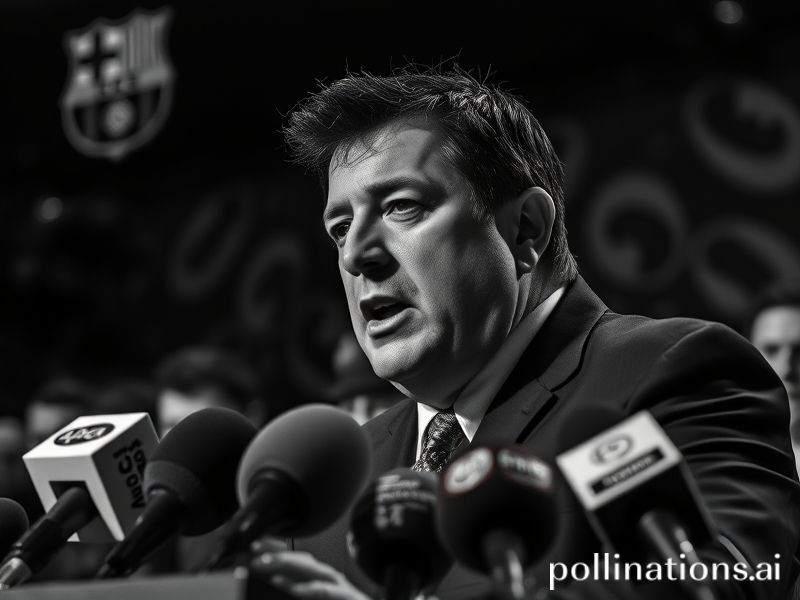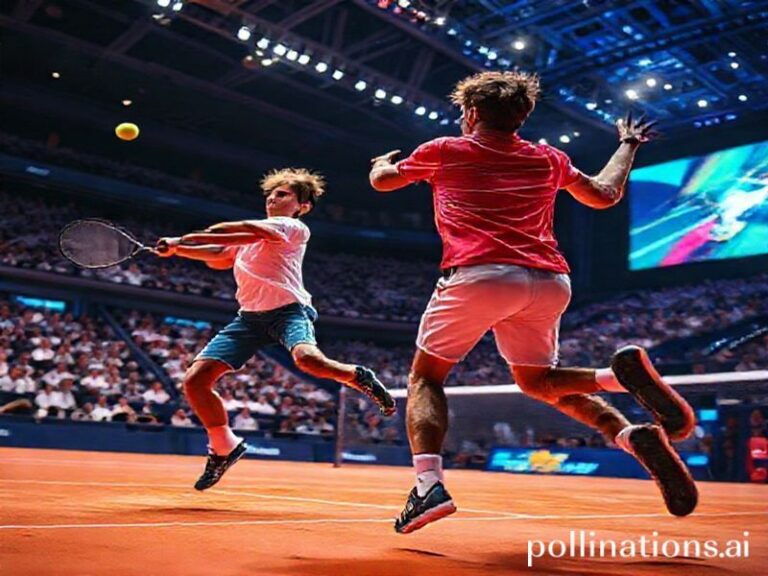laporta
Joan Laporta has always preferred his drama served extra-catalán, but the rest of the planet has now pulled up a chair to watch the banquet unfold. When the Barcelona president strode into the Camp Nou press room last week—tie slightly askew, smile calibrated somewhere between messianic and “please don’t audit the books”—he wasn’t merely announcing another sporting project. He was issuing a geopolitical memo disguised as a football briefing, the kind of document that makes Zurich, Doha, and Washington sit up and notice that a glorified ball game in northeastern Spain might nudge sovereign credit ratings after all.
To the untrained eye, Laporta is just another silver-haired lawyer who happens to own a club so broke it had to sell its television rights like family heirlooms on eBay. Yet on the international stage he has become a walking stress test for late-stage capitalism. Consider the choreography: one minute he’s on the phone with Goldman Sachs reassuring them that Spotify’s name on the stadium is not a temporary tattoo; the next he’s on Catalan radio promising independence by Tuesday teatime. Global investors, who long ago replaced rosaries with Bloomberg terminals, now recite “leveraged buyouts” in Catalan accents just to hedge their sins.
The implications ripple outward with the elegance of a stone skipped across a stagnant pond. In Riyadh, officials study his financial gymnastics like a holy text: if Barcelona can monetise future TV money to pay today’s electricity bill, surely the Saudis can package camel-racing futures into green bonds. In Brussels, eurocrats who spent the summer lecturing Italy on fiscal temperance now wonder why Catalan debt gets a stadium-full of ultras singing its name. Meanwhile, over in London, Premier League chairmen practise the phrase “economic levers” in the mirror, preparing to tell fans that selling the club’s history to private equity is actually a love letter to the working class.
Laporta’s genius—if we’re grading on the curve set by the last decade of global leadership—lies in weaponising nostalgia. He has convinced an entire generation that mortgaging tomorrow for a shot at today’s Champions League is not desperation but romance. It’s the same pitch every populist from Buenos Aires to Budapest has used: remember when we were great? Good, now sign here. The difference is the collateral happens to be a 124-year-old football club rather than, say, a national pension system. Small mercies.
Of course, cynics will note that Barcelona’s current solvency depends on the kindness of crypto exchanges and the attention span of streaming giants—two industries whose life expectancy rivals that of a fruit fly in a hurricane. Should the NFT bubble pop or TikTok fall out of fashion with Gen Z, Laporta’s grand edifice could collapse faster than you can say “leveraged liquidity.” But that’s tomorrow’s problem, and modern leadership has evolved past the quaint notion of consequences arriving before the next election cycle.
The broader significance is almost poetic: a regional politician in a country that still hasn’t decided whether it’s one country has managed to turn the global sports-industrial complex into his personal revolving credit line. If that doesn’t sum up the 21st-century condition—borders blurred, loyalties rented by the season, and every crisis rebranded as a growth opportunity—then perhaps we deserve the meteor already.
For now, the world tunes in each weekend to watch 11 millionaires in fuchsia stripes chase a ball, blissfully aware that every completed pass is also a tiny act of quantitative easing. Laporta stands in the directors’ box, arms aloft, the very picture of a man who has bet the house, the neighbours’ house, and possibly the concept of houses themselves on next Saturday’s result. Somewhere an IMF intern updates a spreadsheet titled “Systemic Risk: Football Edition.” The intern sighs, sips cold coffee, and adds a footnote: “See also: Super League, 2021.” Humanity, it seems, never learns—but it does refinance.







